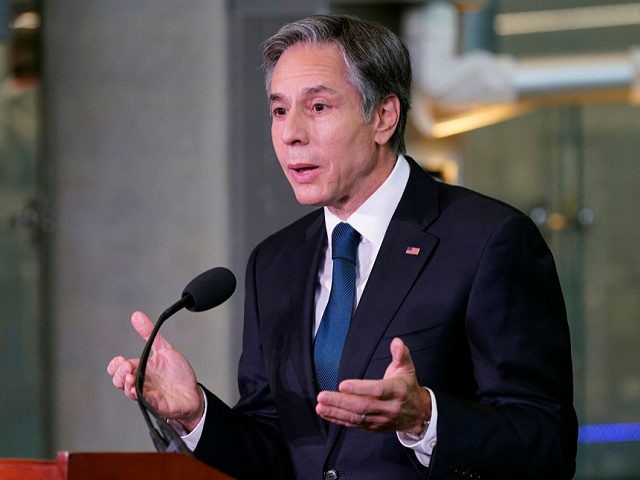Secretary of State Antony Blinken did not offer a clear answer to Congress on Wednesday when asked if the administration of President Joe Biden would submit any binding global document on pandemics to the Senate for ratification.
The question, raised by Rep. Chris Smith (R-NJ), surfaced in the context of the upcoming World Health Assembly (WHA), the World Health Organization’s (W.H.O.) annual convention. The W.H.O. has, for the past three years, attempted to galvanize the world to agree to a legal structure giving power to the U.N. health agency over public health emergencies that could grow into epidemics or pandemics, attempting to use momentum for clear protocol arising in the aftermath of the Wuhan coronavirus pandemic.
The proposed “pandemic treaty” has been so controversial that W.H.O. member states have not been able to agree on what to call it; the official nomenclature is currently the “W.H.O. convention, agreement or other international instrument on pandemic prevention, preparedness and response,” or “WHO CA+.”
The debate around what kind of document the pandemic accord will be in the United States has essentially centered on if it will be a treaty. The Constitution requires all treaties — binding agreements with foreign powers — to receive two-thirds support in the Senate; the president cannot unilaterally sign America into a treaty. Presidents have avoided this requirement in the past by designating international agreements, such as the Paris Climate Agreement and the Joint Comprehensive Plan of Action (JCPOA, or Iran nuclear deal) during the presidency of Barack Obama, “executive agreements.”
The House Freedom Caucus sent Biden a letter demanding he stand against the W.H.O.’s push for a “global pandemic treaty.” https://t.co/3l9IUel17X
— Breitbart News (@BreitbartNews) May 24, 2022
Smith essentially asked Blinken if Biden planned to use the “executive agreement” exception to get around Congress during a hearing on Wednesday.
“The World Health Assembly…they’re violating their own rules about procedure. Are you going to submit the WHO pandemic treaty, which is rife with problems, to the Senate for ratification?” Smith asked. The comment about “violating their own rules” was in reference to W.H.O. countries, failing to agree on an updated pandemic document, issuing a statement in which they “agreed to resume hybrid and in-person discussions over coming weeks to advance work on critical issues,” beyond the planned meeting times.
The secretary of state did not offer a definitive clarification, arguing that the participating countries are so far from agreeing on an international law governing pandemics that such a discussion is not currently necessary.
“On the pandemic agreement, the way things stand right now, I don’t see that coming to a conclusion in the near term,” Blinken responded. “There’s just not consensus on it. It’s something we continue to work on, but continue to work on making sure that we uphold our own interests and values, including on, for example, intellectual property.”
During questioning on the @WHO pandemic treaty from Subcommittee on Global Health, Global Human Rights and International Organizations Chairman Chris Smith, @SecBlinken stated, "I don't see that coming to a conclusion… There's just not consensus on it." pic.twitter.com/prYstBl10s
— House Foreign Affairs Committee Majority (@HouseForeignGOP) May 22, 2024
The W.H.O. received support from 23 member countries in 2021 to begin working on a “pandemic treaty.” Establishing agreement on the specifics of such an agreement has remained elusive since, as critics have expressed concern about expanding the W.H.O.’s power in the aftermath of its disastrous response to the Wuhan coronavirus pandemic. One specific provision that has aroused controversy is the attempt to expand the W.H.O.’s power to declare a situation a Public Health Emergency of International Concern (PHEIC) when the country where the situation is occurring is resistant to doing so.
Supporters of such a provision say that it would help clarify health emergencies in cases such as the Wuhan coronavirus pandemic, in which the Chinese government reportedly pressured the W.H.O. not to declare a PHEIC (both sides have denied such reports). Opponents say that taking away a government’s power to administer a public health emergency is an unacceptable violation of sovereignty.
Another point of contention has been attempts to create “equitable” international structures for the distribution of medicine, vaccines, and other health supplies, as well as challenges to the ownership of intellectual property by pharmaceutical companies, as Blinken mentioned.
Related: WATCH — President Donald Trump in 2020: “We Are Terminating” Our Relationship with W.H.O.
White HouseThe pandemic accord, as well as attempts to amend the International Health Regulations (IHR), are expected to be paramount issues at the World Health Assembly, expected to begin on Monday.
Congressional leaders have expressed elevated concerns regarding the pandemic accord. In April, more than half of the Senate signed a letter to Biden urging him to reject what it described as a potential “intolerable infringement upon U.S. sovereignty.” In the House of Representatives, Rep. Tom Tiffany (R-WI) introduced a bill in March 2023 explicitly requiring Biden to submit the pandemic accord to the Senate as a treaty. As of May 14, the bill has amassed more than 50 co-sponsors.
When Tiffany introduced the bill, Biden’s representative at the W.H.O. negotiations, Pamela Hamamoto, asserted during talks that “the United States is committed to the Pandemic Accord, to form a major component of the global health architecture for generations to come.”

COMMENTS
Please let us know if you're having issues with commenting.